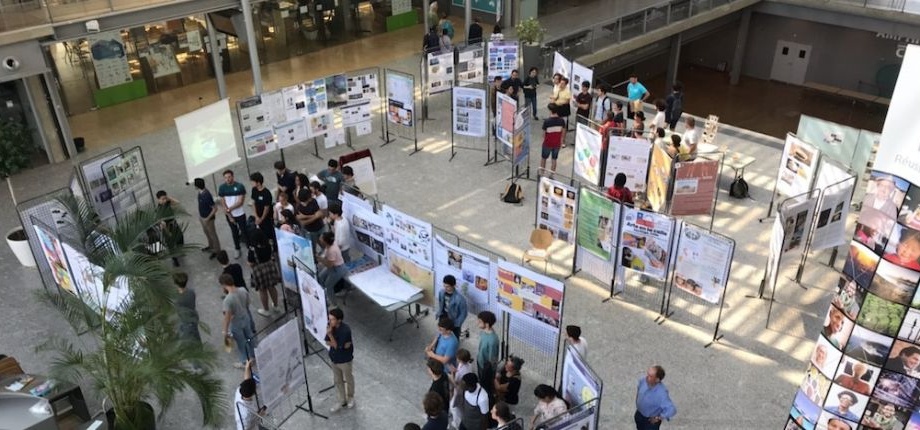German
German, the second language on Europe’s employment market
“There’s no point learning German! Everyone there speaks English!” This claim is as widespread as it is superficial. There are still very good reasons to learn German:
- It is the language of with the most native speakers in Europe.
- The French economy lacks people who speak German. Every year, thousands of positions remain unfilled.
- Germany and France are linked by a unique network of relations, which favors Franco-German qualifications, internships, exchanges, and scholarships.
- Germany is France’s leading economic partner, and vice versa. There are 2000 French companies based in Germany, 2000 German companies in France, and 500,000 people work in Franco-German exchanges.
- German language culture has produced great philosophers, writers, musicians, filmmakers, and scientists, but Germans also know how to enjoy themselves, as the 2006 World Cup impressively showed!
Source: German, a passport to Europe, brochure published by the French and German governments, the Franco-German university, the Goethe Institute, and the German Office for Academic Exchanges.
A study conducted by the Paris Franco-German Chamber of Commerce and Industry, by the Institut der deutschen Wirtschaft Köln and by the French Ministry of Foreign and European Affairs clearly showed that “apart from English, German is the language in greatest demand on the employment market in Europe. In France, 4000 German-speaking executive positions are not filled, and the big German companies are particularly keen to attract qualified French staff.”
Teaching
The German language program includes three different types of courses: language courses (Beginners, Intermediate, Middling), thematic courses (higher level) on a variety of subjects such as architecture, politics, the media, cinema, theatre, as well as work-related courses. These classes are designed to improve linguistic skills and sociocultural knowledge.
The aim of the teaching is for students to acquire, while at the School, the capacities they will actually need in their future work, both for professional communication and for life in Germany. The emphasis is placed on comprehension and oral and written expression. Students increase their vocabulary and improve their grasp of grammar. Classes are based on a communicative approach: students learn the language through applying it. The teaching is based on material designed for the levels and objectives of each course. Varied and relevant materials are used. German culture is also an integral part of each module. Multiple subjects are covered, so that students discover all facets of Germany. In other words, the course is not limited to purely linguistic aspects, but deals with societal, economic, political, and cultural factors.
The German teachers enjoy sharing their curiosity and enthusiasm with students. They also try to be responsive when students express their needs as future engineers and managers.
The German section sees itself as an integral part of the School’s educational project and therefore works closely with other sections of the School’s Languages and Cultures Department as well as its other departments, in particular the Careers Guidance Department.
External certification
The German language learning program at École nationale des ponts et chaussées is geared to the Goethe-Institut’s curriculum. Content and objectives are set by the European Framework of Reference for Languages and reflect the skills required for the language examinations. Students have the option to take internationally recognized exams in cooperation with the École Polytechnique and the Goethe-Institut, Paris.
Intercultural learning
In our era of accelerated globalization, it seems essential to encourage students to develop intercultural skills. The requirements that future engineers and managers face have changed and demand new linguistic and behavioral abilities. They must be capable of working abroad, as well as within multicultural teams, which may also be virtual. The German section seeks to train students to operate in intercultural contexts, in other words to pass on knowledge and skills that will help them to work and live abroad and with foreigners.
This kind of training is done in groups and incorporated into professionally oriented classes such as ‘Fit für Deutschland’ or ‘Deutsch für den Beruf’. The methods used differ from traditional teaching.
This intercultural training is carried out by an intercultural coach/trainer certified by the Humboldt- Universität of Berlin.
Debatte-Debattieren
A specific program has been created where students have the opportunity to debate multiple topics relating to political, economic or cultural life. All students are welcome. This exercise goes well beyond simple oral expression. It is fun, argumentative, and stimulating for everyone. The ‘Debatte - Debattieren’ course takes place once a week at the School and debating competitions are organized with other schools during the academic year.
Individual support
The German section also offers the possibility of individual support for written or oral work, for the preparation of an external exam, the writing of a CV or application letter, preparation for interviews or for stays abroad.
The teaching team
The teachers are all native German speakers and have a range of experience in Grandes Écoles and Universities, as well as at the Goethe-Institut and in business environments.

